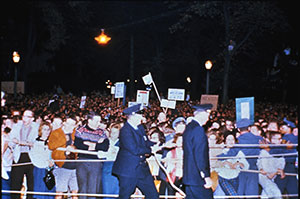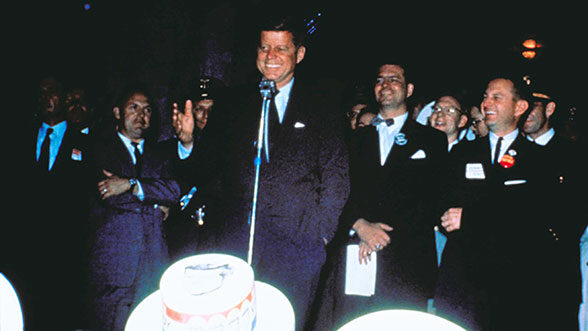
Crowds jam the streets to see JFK at the Michigan Union, 1960. (Image courtesy of the Frederick L. Shippey Collection, U-M’s Bentley Historical Library.)
A keen BS detector
Even as memorials herald the centennial of John F. Kennedy’s birth May 29–reflecting on his enduring inspirational powers, his tumultuous term in the White House, the myth of Camelot and, of course, the assassination in Dallas–they might not get to this:
Kennedy, a World War II combat veteran seen as a hawkish Democrat while president, had to fight his most aggressive military advisers, repeatedly, to keep the country out of war.
What, as a young commander-in-chief, gave Kennedy the confidence to contradict these men?
Historian/author James Blight, CIGI chair in foreign policy development at the Balsillie School of International Affairs in Waterloo, Ontario, says it was Kennedy’s prior personal experience with so-called experts, particularly in the military and medical fields, that fomented his distrust.
“Experts, to Kennedy, are bullshitters,” says Blight, ’70, who, ironically, is an expert on Kennedy. “Especially if they say, or if other people say, they’re experts.”
Dangerous times
So, a keen BS detector helped keep the United States from going to war in the early 1960s against Nikita Khrushchev and the Soviet Union.
In the Cuban Missile Crisis, all the Joint Chiefs of Staff argued for an air strike to destroy the missiles, followed by a U.S. invasion of Cuba. But Kennedy resisted the calls and the Soviets removed their missiles without any use of force. In Germany, a wall, but not war, emerged over the confrontation in Berlin. Kennedy made use of back channels to suggest that Khrushchev remove his tanks, promising that if he did so, the U.S. would reciprocate. The standoff ended peacefully.
“Kennedy was president at probably the most dangerous time in our history,” says Blight, who was an anti-war protester and scholarship baseball player at U-M. “There are these crises popping up everywhere. And any one of them–because they’re not crises with small countries, they’re crises with the Soviet Union–any one of them could have blown up into a nuclear war.
“It was Kennedy against his hawks. It’s Kennedy who prevented the war in the Cuban Missile Crisis. It was Kennedy who prevented this stupid advice he was getting, which was to blow a hole in the (Berlin) wall and tear it down and challenge the Russians right there and get it over with. It’s odd, but America elected, barely, a war hero, tough character, Irish politician. And then behind the scenes he spent virtually all of his thousand and thirty-six days fighting against his hawks to keep the country out of war.”
Kennedy had seen, during his Navy service in the South Pacific in WWII, that the decision makers often made bad decisions.
“The experts in World War I, he reads about them, they don’t know what they’re doing. And then he fights in the Second World War and he gets a visceral feeling. He knows these generals have no idea what’s going on out here,” Blight says.
Painful reality

Prior to the 1960 presidential election, JFK spoke on the steps of U-M’s Union. (Image courtesy of U-M’s Bentley Historical Library.)
Perhaps as influential were Kennedy’s experiences, dating back to his childhood, with experts who tried to treat his myriad medical problems, which included chronic back pain.
“His view of all this is: these clowns don’t know what they’re doing,” Blight says. “My father’s paying for the very best medical advice and service on Planet Earth and these guys tell you, you take one of these and this will happen. That’s crap.”
Yet it must be said that medicines helped Kennedy keep functioning at a high level, whether it was in making the crucial decisions in the Oval Office or thrusting and parrying with reporters.
“Another thing we all believed about him–that wasn’t true–was that he was really healthy and vigorous and all that, which was an act,” Blight says. “It was very carefully managed about what the public saw. I mean, here’s a guy who gave 64 press conferences–many more press conferences than most presidents. He was really good at it. He was like a nightclub performer. And he looked like one.
“So, before Kennedy goes out, he drops his pants and they shove a needle into each side of his butt and these are painkillers, and he takes the steroids orally, usually, unless the pain in his back is so bad he can’t walk. He pulls his pants back up and goes out and is probably one of the greatest actors who ever lived.”
An actor who as commander steered the country away from war.
The U.S. Senate has established a commission to honor Kennedy on the 100th anniversary of his birth, May 29, 2017.




Mike Jefferson - 1984
Revisionist history and fake news. While Kennedy did indeed avert the crisis and prevent war with the SU over Cuba, he directly enabled U.S. involvement in the Vietnam War. Trying to portray Kennedy as a pacifist is simply not factual.
Reply
Robert Scott - BSE 61, MSE 68
I spent the years 1963 and 64 in Vietnam as a young civil engineering officer in the Navy’s Civil Engineering Corps. I think President Kennedy made a huge foreign policy mistake in getting involved in Vietnam.
We also must not forget the Bay of Pigs. Neither President Kennedy or the CIA finest hour
Reply
Frank L. Kratky - 1964 B. Architecture
This brings back many powerful memories of that night in front of the Union. I was fortunate to have been standing on the steps near the front of the crowd listening to this young Senator when he spoke those historic words that challenged young people to reach out to help the world. As I walked home later I was moved by those words to have some hope for world peace in our life time. Later when the new President Kennedy proposed and initiated the U.S. Peace Corps, I knew I would join and serve, which I did in !965-67 in Shiraz, Iran. It changed my life. F.L.K.
Reply
David Stodolsky - 1968
J.F. Kennedy planned to end the US involvement in Vietnam and this was one of the reasons he was killed.
https://www.youtube.com/watch?v=hGayl9uNW4A
https://www.youtube.com/watch?v=srstQVfVNEM
Reply
Roger Szafranski - 1977
If you were to hear President Kennedy’s speeches today you would swear he was a Conservative Republican. Goes to show you how far left the Democrats have traveled.
Reply
Guy Provenza
If you read the Republican platform of 1952 and its support of collective bargaining and social security, you would swear they were socialists. Goes to show you how far right the Republican party has traveled.
Reply
Roger Szafranski - 1977
Guy, a person can say most anything but it doesn’t mean it is true. I would ask you to refer to the specific platform you are referring to from 1952. I find that most conversations with folks of the Democratic persuasion like to make unfounded references. Is this what you are doing Guy?
Reply
Byron Collier - 1986
Roger, you did the same thing. Please quote the specific lines in President Kennedy’s speeches to which you were referring.
Reply